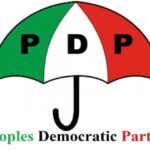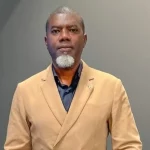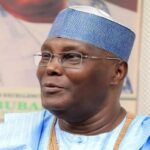After months of consultations across the country, former vice-president, Alhaji Atiku Abubakar, officially made his intention to vie for the presidential ticket of the Peoples Democratic Party (PDP) known to Nigerians. The event which was held at the International Conference Centre in Abuja, was well attended by politicians from all the states of the federation and the Federal Capital Territory (FCT)
Atiku, who hails from Adamawa State in the North-East zone, was the presidential candidate of the PDP in the 2019 elections. He posted his best result in the presidential race in that election, garnering 11.2 million votes and winning in 17 states namely, Abia, Adamawa, Akwa Ibom, Anambra, Bayelsa, Benue, Cross River, Delta, Ebonyi, Edo, Enugu, FCT, Imo, Ondo, Oyo, Plateau, Rivers, Taraba and the Federal Capital Territory (FCT).
His first shot at the presidency, when he got a party’s ticket, was in 2007 under the banner of the defunct Action Congress (AC). In that election only 2.6million of the electorate voted in support of his candidature. He came third with 7.5 per cent of the total votes.
Expectedly, Atiku pitched his message on the precarious situation in the country, anchoring his desire to run again on the need to navigate the ship of state away from tempest to safety and despair to hope.
“Since the civil war, the unity of Nigeria has never been threatened as it is today. Nigerians are losing hope in the oneness of this country. My fellow Nigerians, I am the unifier that is coming to bond the broken union.
“The 2023 election is not just like the usual elections; it is a referendum to decide whether we want greatness or continuous destruction. It is a choice between two paths: the path of unity and progress or the path of division and backwardness.
“We need a new kind of leadership that will steer us to a positive path. In 2023, we want a president who has ideas on how to fix Nigeria. We want a president who understands, who inspires and is empathetic,” he said.
In discourse about 2023, Atiku’s name features as one of the most experienced politicians with clout and network across the country. He is also reputed to keep one of the best think tanks researching solutions to the country’s myriad of challenges.
The leadership of the PDP, more often than not, has spoken in favour of making sure that the best presidential candidate from any part of the country is the one that the party will field in the election. At the same time, a committee of 37 wise men and women has been inaugurated to handle the delicate issue of zoning, amidst clamour from PDP governors and leaders and pressure groups from the South that power must oscillate to the South in 2023, the presidency having resided in the North for about eight years.
But despite the façade of the ticket being open, there appears to be a political understanding among the PDP grandees from the North and partly from the South that the presidential standard-bearer of the party will come from the North.
A preponderance of aspirants who have so far declared their aspirations are from the North with only former Secretary to the Government of the Federation and ex-Senate President, Pius Anyim and the former governor of Anambra and Atiku’s running mate in 2019, Mr Peter Obi, expressing interest in the ticket from the South.
The former vice-president appears the most formidable of the offerings so far in PDP. In fact, observers see his formidability as the reason three other aspirants from the North, former Senate president, Bukola Saraki, governors and Sokoto, Aminu Tambuwal and Bala Mohammed of Bauchi State are trying to cede it to one of them to face Atiku.
Atiku did not get the ticket of the PDP on a platter in 2019. The governors of the party led by the Rivers State governor, Nyesom Wike, were said to be rooting for Tambuwal until representatives of the founding fathers of the party arrived Port Harcourt and swung things in favour of Atiku.
Atiku and the hurdles this time
The road to the presidential ticket for Atiku this time appears thorny as usual. Investigation by Sunday Tribune has revealed that Atiku, 75 years of age, does not seem to enjoy the support of a number of PDP governors who prefer a younger candidate. Some of these PDP governors have openly canvassed that anyone who is 70 and above should perish the thought of gunning for the party’s ticket.
Consequently, they have been holding the structures of the party in their states tightly from the prying eyes of Atiku and his men. The governors, particularly from the South, appear closely knit in their class action on power rotating back to the South and thus would not contemplate Atiku as candidate.
Having been in political circulation for more than four decades, there are leaders who feel Atiku and other members of the Old Order should give room for a generational shift of power. The call is, however, not homogenous because there is a counter-argument from other stakeholders in the party and beyond who feel the older the cherry, the sweeter the juice.
A chartered accountant and secretary of the PDP in Ogun State, Honourable Sunday Solarin, while reacting to the age factor, said the people of America chose Joe Biden over Donald Trump because of his experience, capacity and ability to deliver the goods. “In Nigeria and I dare say Africa as a whole, we venerate the aged because they embody experience, patience, wisdom and impeccable intelligence. This is why it is said that an old man that dies in Africa is like a library set ablaze. We need the older generation to nurture the younger generation to maturity,” he said.
A chieftain of the All Progressives Congress (APC) and former Minister of Communications, Chief Adebayo Shittu, also thinks age should not factor in determining the next president of the country.
“It is not about age, but intelligence, exposure, experience and qualification. There are several people who are young but are political imbeciles. The emphasis must be on qualification, experience and capacity to manage human and material resources, to have vision of what Nigeria should be in the next four years,” he said.
The battle for non-PDP states
Atiku is said to be acutely aware of the governors’ vice grip on the structures of the party in their states, but has decided to focus on non-PDP states. PDP has 12 governors, leaving 24 states and the FCT greenfield sites. Even among the governors, Umar Fintiri of Adamawa State, seems to have broken ranks with his colleagues by naturally declaring support for Atiku, his mentor, describing him as the best man for the job.
According to feelers from those states, Atiku has not only been having the upper hand in those states, he is also consolidating his dominance ably supported by his high political network across the country. A chieftain of the party confided in Sunday Tribune that it is not a matter of ‘if, but when’ Atiku clinches the ticket of the party.
Will the North go Red from Blue for presidential election?
In 2019, Atiku’s candidacy did not seem to resonate with the Northerners who showed their preference for Buhari, except in Benue, Adamawa, Taraba and FCT.
In an interview after the election, some Northern oligarchs blamed Atiku’s mass rejection in the North on his avowed commitment to restructuring of the country if elected president.
The North benefits from the country’s wobbly structure and any attempt at tinkering with the structure will mean that the region will forfeit some of the advantages it currently enjoys.
What happens if PDP and APC go hemispherically in the choice of presidential candidates? In other words, if PDP picks Atiku and APC chooses a Southern candidate, will the North be red, that is, vote Atiku or will it remain blue by sticking to APC as it did in 2019?
Watchers of North’s politics believe the raison d’être for northerners to love APC is President Muhammadu Buhari who is reputed for having a massive following among the talakawas in the region. With Buhari not on the ballot in 2023, they see a change in the voting pattern of the North. In 2011 when Buhari ran on the platform of the defunct Congress for Progressive Change (CPC), he garnered 11m votes mainly from the North with only one CPC governor in Nasarawa State.






